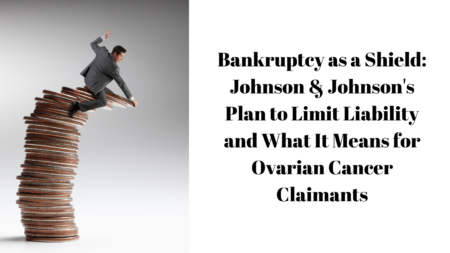In a bold and controversial move, Johnson & Johnson (J&J) has announced a Plan of Reorganization through its subsidiary, LLT Management LLC, to resolve nearly all current and future ovarian cancer claims related to its talc products. While J&J paints this maneuver as a fair resolution for claimants, a deeper look reveals a troubling trend: the use of bankruptcy to sidestep complete financial liability and avoid meaningful accountability. Voting yes on this Plan is not just a financial decision but a stand against justice and corporate accountability principles.
The Plan: A Quick Resolution or an Evasion of Responsibility?
J&J’s Plan of Reorganization, explained through the “Official Talc Claims” website, is set to address 99.75% of pending talc lawsuits in the United States. However, this plan, set to be finalized through a “prepackaged” Chapter 11 bankruptcy if 75% of claimants vote in favor, has significant implications for the claimants and the broader justice system. The voting deadline is July 26, 2024.
According to J&J, the Plan provides ovarian claimants with a value of approximately $6.475 billion to be paid over 25 years. The company argues that this amount is more than claimants could expect from lengthy litigation. Yet, this approach effectively caps J&J’s financial liability and allows it to avoid the full consequences of its alleged negligence.
A History of Bankruptcy Abuse
J&J is not the first corporation to use bankruptcy as a shield against liability. Companies like Johns-Manville, W.R. Grace, and Owens Corning have similarly used bankruptcy to manage asbestos claims. These companies have relied on Section 524(g) of the U.S. Bankruptcy Code, which allows for the creation of trusts to handle present and future asbestos claims, thereby limiting their direct financial liability and enabling them to continue operating.
This strategy raises critical concerns about civil justice. It undermines our judicial system by denying full compensation and their day in court to those harmed by corporate negligence. Instead, it favors corporate interests over the rights of individuals, often leaving claimants with less than they would receive through traditional litigation.
The Importance of Civil Justice and Informed Voting
As the July 26 voting deadline approaches, it is crucial for all claimants to read the fine print before casting their vote. While the proposed settlement offers a seemingly substantial payout, the individual payments are significantly less than the average amount of medical bills for a patient suffering from ovarian cancer. After legal fees and repayment of medical liens, most cancer victims will still be left with a bill to pay. Moreover, future cancer victims would not even get a choice and would waive any legal rights.
Civil justice is a cornerstone of our legal system, ensuring that individuals can hold powerful entities accountable for their actions. The practice of using bankruptcy to limit liability threatens this balance, favoring corporate profit over justice for victims.
Read the Fine Print, Protect Your Rights
Johnson & Johnson’s Plan of Reorganization represents a significant moment in the ongoing debate over corporate accountability and the use of bankruptcy in mass tort cases. While the company frames the Plan as a beneficial resolution for claimants, it also exemplifies a growing trend of corporations using bankruptcy to evade fiduciary responsibility for their actions.
I am not a lawyer, but if you have one, you should seek legal counsel before you vote. You can also review Navigating Asbestos Litigation: Critical Questions to Ask When Choosing a Law Firm to help inform your decision.
As claimants consider their vote, weighing the immediate financial benefits against the broader implications for justice and accountability is imperative. Civil justice must prevail to ensure corporations cannot simply buy their way out of responsibility, leaving victims without proper recourse.
Voting yes on this Plan is not just a financial decision but a stand against justice and corporate accountability principles. Every claimant should approach this decision with careful consideration and an understanding of its long-term consequences. During the past 20 years at ADAO, I have learned the importance of reading the fine print, and if the industry asks for a yes vote, beware.
Linda Reinstein

